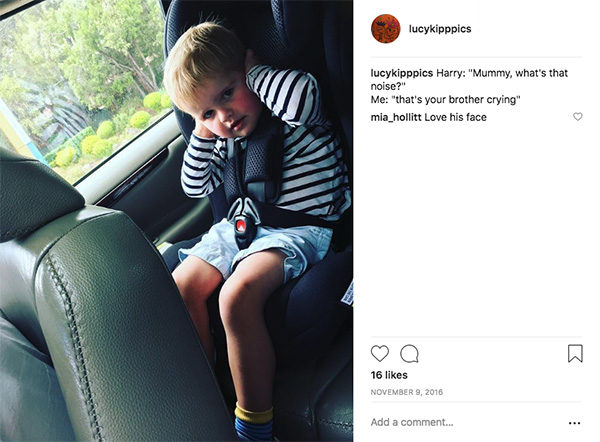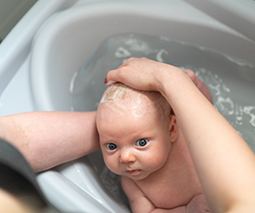How I survived my baby’s colic (without losing my mind)

Here’s a wild fact: The first ever mention of colic was in the first paediatric textbook, Thomas Phaer’s The Boke of Chyldren, published in 1544.
That’s how long this seemingly innocently-named affliction has been troubling parents.
Parents just like me, who spent the first two months of both my children’s lives dreading the hours between 4 and 6pm.
During those times, each of my babies would transform from a relatively quiet and settled infant, who I genuinely loved spending time with, into a red-faced screaming hot mess.
I am a colic survivor
The pram was the place for our first son. I’d walk at pace down our local bike track, hoping the overhanging trees would soothe him. They didn’t.
“This is the hardest thing I have ever done,” was my most repeated phrase at this time of my life.
I had slightly more luck with baby number two, thanks to the fact that I knew what to expect AND we’d invested in a baby carrier that he basically lived in. Sometimes too, we’d take a drive.
But that came with mixed results for other reasons. Like this one …

So what is colic exactly?
Colic is a period of unexplained excessive crying and unsettledness in babies that can start any time from a few weeks of age and usually subsides by around 4-6 months. Very often the crying is accompanied by your baby drawing their tiny legs up to their chest.
Despite the fact that we’ve known about colic for centuries, it remains one of those things for which there is no medical explanation. Which makes it even tougher to cope with when you’re an exhausted new parent.
Some experts explain it as largely a developmental stage, because it tends to stop at about 12-15 weeks of age, when baby begins to wake up and be more aware of their environment.
But that doesn’t mean it makes it any easier to deal with at the time.
I mean, why did my baby’s unsettled period have to start in the late afternoon? Don’t babies understand how much stuff you have to do?
Read more about colic and babies:
- “Do whatever you need to get you through!” Experts get real about colic
- 5 theories about colic and colicky babies
- Scientists find probiotics could help settle babies with colic
How to survive the colicky weeks
With that in mind here are five things that I found useful through our colicky days. Try them and see if they work for you.
And know this: When it comes to colic, this is definitely one parenting experience that you can trust when people tell you that it will pass. It really will!
1. Invest in a baby carrier
This seems to be a common calming solution for colicky babies. Or at the very least, it buys you some time. Baby is close to you and your hands are free, which means you can get a few things done while whispering sweet nothings in their cute little ears.
2. Pram walks
My mum used to swear by pushing the pram up and over a bump in the living room floor when my baby sister had colic. The upside of walking for me was that it also elevated my mood a bit and shifted my focus away from my screaming baby, and strangely it gave me a boost of energy too.
3. Chat to your pharmacist
There are specific probiotics designed for babies to settle exactly these kinds of symptoms. They can be worth a try.
4. Cuddle time
This is SO hard to do when you have older children who also need your attention. But skin-on-skin contact, and even singing to your bub, really does seem to help calm them down.
5. Get some back up!
Ask a friend to visit at that time for an extra set of hands. Or borrow your elderly neighbour. Mine would happily rock our second son back and forth for a good 15 minutes so I could whip the clothes off the line and make a start on dinner. Priceless.
This post was sponsored by BioGaia Probiotic Drops for infant colic relief.
Always read the label. Follow directions for use. If symptoms persist or worsen, talk to your health professional.








